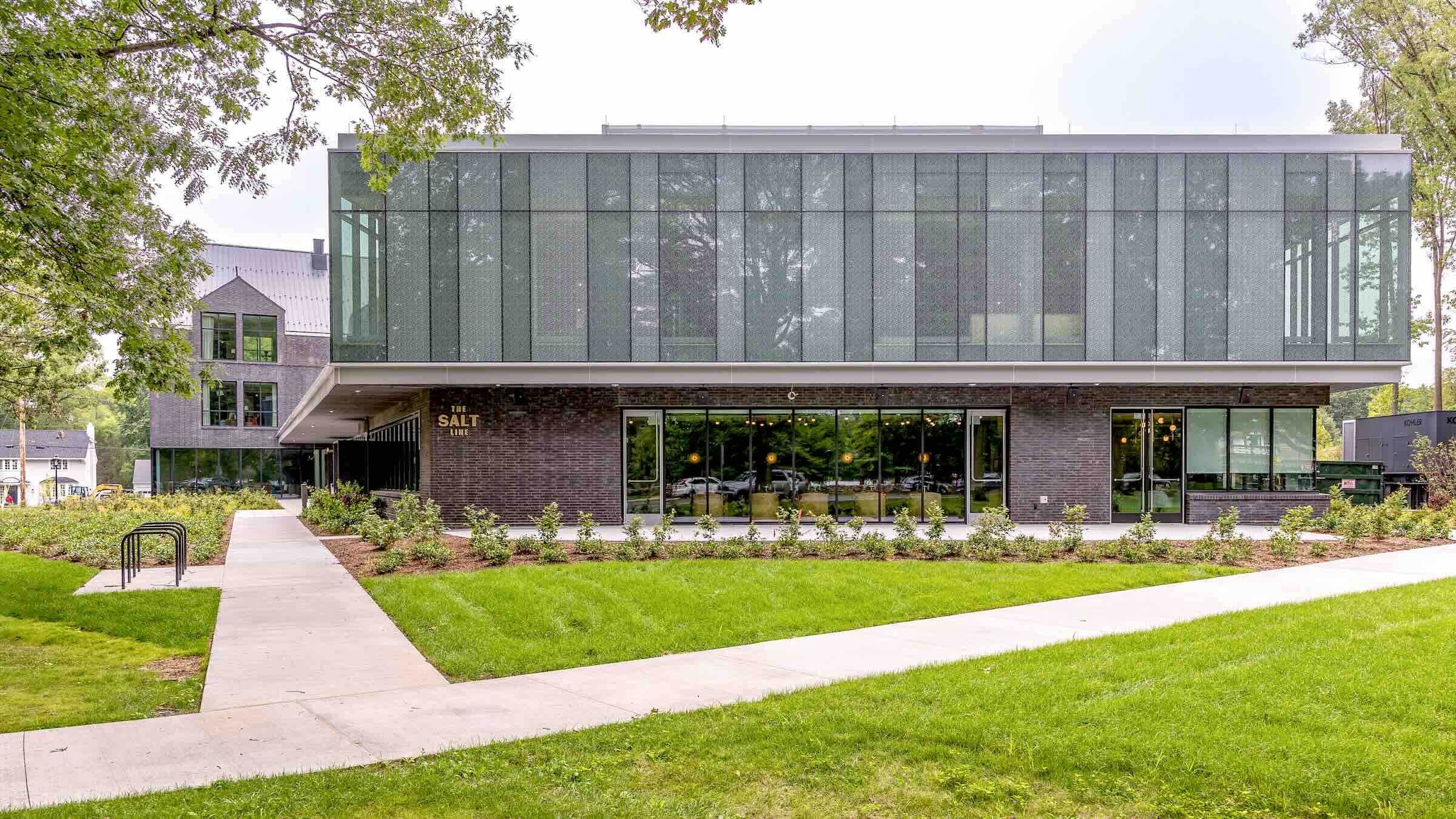Vassar Awards Grants for Six Signature Programs to be Held at the New Vassar Institute for the Liberal Arts
The Vassar Institute for the Liberal Arts, scheduled to open in the fall, will host a series of symposiums during the 2024–25 academic year that address multifaceted issues of local, national, and global concern, College officials announced this week. The College awarded grants to members of the Vassar community for Signature Programs on a wide variety of topics. Located adjacent to the campus, the Institute, The Heartwood at Vassar hotel, and The Salt Line Hudson Valley restaurant are in the final stages of construction.

Photo by Buck Lewis
Robert Brigham, Institute Director and Shirley Ecker Boskey Professor of History and International Relations, said a major goal of the Institute is to “serve as Vassar’s public classroom and to highlight the great work our faculty and others on campus are doing in a way that engages a broader audience. Through the Institute, Vassar aims to play a critical convening role in continuing to elevate ideas, perspectives, and ways of working and living that model how our world can become a more just, humane, and democratic place.”
Signature Programs for 2024–25
Eco-Visions: Finding Your Place in Environmentalism aims to provide participants with opportunities to see how environmental action can take shape in all aspects of life and highlight how legal innovations might be underused tools to aid and contribute to climate justice.
Convened by: Keri Van Camp, Director of the Preserve at Vassar; Jennifer Rubbo, Director of the Vassar Environmental Cooperative; Kenneth Foster, Director of Sustainability; Ariptha Kodiveri, Assistant Professor of Political Science; and Ethan Skuches, Vassar-Kenauk Conservation Fellow.
The Entrepreneurial Mind and the Liberal Arts seeks to disrupt traditional models of entrepreneurship by engaging the values of the liberal arts to inspire new approaches to how individuals can mobilize vision into action and real-world problem-solving.
Convened by: Julián Aguilar, Academic Computing Consultant in the Office of the Vice President for Technology and Human Resources.
Transgressing Borders: Reimagining Education and the Role of Learning in Community is a multi-day workshop and festival aimed at reimagining how institutions of higher education and local community members work together in a generative way. The event aims to reshape how we think about “town-gown” dynamics and explore opportunities for shared learning and development.
Convened by: Elizabeth Cannon, Director of Vassar’s Office of Community-Engaged Learning.
Belonging and Beyond: Using Future Histories to Reimagine Teaching and Learning offers educators and students an opportunity to use “future imagining” methodologies to generate radically inclusive and exciting teaching and learning spaces in higher education.
Convened by: Candice Lowe Swift, Associate Professor of Anthropology, Africana Studies, and International Studies, and Eréndira Rueda, Associate Professor of Sociology and Director of Latin American and Latinx Studies.
Promoting Partnerships to Advance Educational Justice in Poughkeepsie is a multi-day workshop. It will explore the social, political, and historical factors contributing to educational inequities within the city and town of Poughkeepsie and how youth and their families experience these inequities both in school and through interactions with criminal justice systems. Participants will develop real-life avenues for coordination between programs and services that support at-risk youth and help them complete their secondary education.
Convened by: Molly Shanley, Professor Emerita of Political Science; Taneisha Means, Associate Professor of Political Science on the Class of 1951 Chair; Erin McCloskey, Professor of Education; and Andy Borum, Assistant Professor of Mathematics and Statistics.
Soundscapes and the Anthropocene will explore how humans influence natural sound environments and how sound environments in turn influence us by drawing on a broad range of disciplines including ecology, animal behavior, sensory neuroscience, human psychology, sociology, music, the arts, and architecture.
Convened by: Megan D. Gall, Associate Professor of Biology and Director of Neuroscience and Behavior, and Justin Patch, Associate Professor and Chair of Music.
Wesley Dixon, Institute Program Director and Deputy to the President and Secretary of the Board of Trustees, said the proposals selected for Institute Signature Programs were among more than 16 proposals submitted to the College for consideration. “These Signature Programs best exemplify the spirit of the Institute,” Dixon said. “Our faculty and others are collaborating with partners across the campus, in the local community, and around the country to engage in meaningful dialogue about some of the most pressing issues of our time.” In addition to the six funded programs, a number of other events at the Institute will be scheduled throughout the year, Dixon said.
The proposals were chosen by the Institute for the Liberal Arts Committee, composed of faculty, students, and administrators. Committee member Elizabeth Hoffman, Director of Parent and Family Giving in the Office of Advancement, said the proposals submitted “were everything we hoped they’d be. They were so detailed and thoughtful, and they tackle big and important subjects.”
Institute Director, Professor Robert Brigham said he was impressed with the scope and vision of the Signature proposals. “We had many more deserving ideas than we could fund,” Brigham said. “That’s a good sign for the vitality of the Institute and our community.”
These programs will be open to the public with registration available on a first-come, first-served basis; details will be posted on the Institute website in the fall.